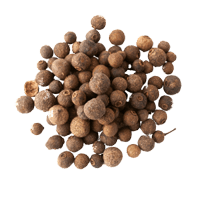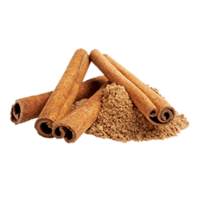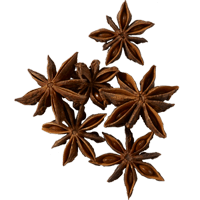Cardamom nutrition: calories, carbs, GI, protein, fiber, fats
Spices, cardamom
*all the values are displayed for the amount of 100 grams
Top nutrition facts for Cardamom
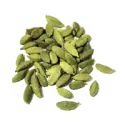
| Calories ⓘ Calories for selected serving | 311 kcal |
|
Glycemic index ⓘ
Source: 82 with glucose (glucose 100) http://www.als-journal.com/712-19/ 94 with glucose (glucose 97) https://www.ncbi.nlm.nih.gov/pmc/articles/PMC5897315/
Check out our Glycemic index chart page for the full list.
|
0 (low) |
| Net Carbs ⓘ Net Carbs = Total Carbohydrates – Fiber – Sugar Alcohols | 40 grams |
| Default serving size ⓘ Serving sizes are mostly taken from FDA's Reference Amounts Customarily Consumed (RACCs) | 1 tsp, ground (2 grams) |
| Acidity (Based on PRAL) ⓘ PRAL (Potential renal acid load) is calculated using a formula. On the PRAL scale the higher the positive value, the more is the acidifying effect on the body. The lower the negative value, the higher the alkalinity of the food. 0 is neutral. | -22.6 (alkaline) |
| Oxalates ⓘ https://www.researchgate.net/publication/223973698 https://www.sciencedirect.com/science/article/abs/pii/S0889157513000902 | 4014 mg |
Cardamom calories (kcal)
| Calories for different serving sizes of cardamom | Calories | Weight |
|---|---|---|
| Calories in 100 grams | 311 | |
| Calories in 1 tsp, ground | 6 | 2 g |
| Calories in 1 tbsp, ground | 18 | 5.8 g |
Cardamom Glycemic index (GI)
Source:
82 with glucose (glucose 100) http://www.als-journal.com/712-19/ 94 with glucose (glucose 97) https://www.ncbi.nlm.nih.gov/pmc/articles/PMC5897315/
Check out our Glycemic index chart page for the full list.
Mineral coverage chart
Mineral chart - relative view
Vitamin coverage chart
Vitamin A:
0µg of 900µg
0%
Vitamin E:
0mg of 15mg
0%
Vitamin D:
0µg of 20µg
0%
Vitamin C:
63mg of 90mg
70%
Vitamin B1:
0.59mg of 1mg
50%
Vitamin B2:
0.55mg of 1mg
42%
Vitamin B3:
3.3mg of 16mg
21%
Vitamin B5:
0mg of 5mg
0%
Vitamin B6:
0.69mg of 1mg
53%
Folate:
0µg of 400µg
0%
Vitamin B12:
0µg of 2µg
0%
Vitamin K:
0µg of 120µg
0%
Vitamin chart - relative view
Macronutrients chart
Protein:
Daily Value: 22%
10.8 g of 50 g
10.8 g (22% of DV )
Fats:
Daily Value: 10%
6.7 g of 65 g
6.7 g (10% of DV )
Carbs:
Daily Value: 23%
68.5 g of 300 g
68.5 g (23% of DV )
Water:
Daily Value: 0%
8.3 g of 2,000 g
8.3 g (0% of DV )
Other:
5.8 g
5.8 g
Fat type information
Saturated fat:
0.68 g
Monounsaturated fat:
0.87 g
Polyunsaturated fat:
0.43 g
Fiber content ratio for Cardamom
Sugar:
0 g
Fiber:
28 g
Other:
40 g
All nutrients for Cardamom per 100g
| Nutrient | Value | DV% | In TOP % of foods | Comparison |
| Vitamin A | 0µg | 0% | 100% | |
| Calories | 311kcal | 16% | 28% |
6.6 times more than Orange
|
| Protein | 11g | 26% | 42% |
3.8 times more than Broccoli
|
| Fats | 6.7g | 10% | 44% |
5 times less than Cheese
|
| Vitamin C | 21mg | 23% | 19% |
2.5 times less than Lemon
|
| Net carbs | 40g | N/A | 22% |
1.3 times less than Chocolate
|
| Carbs | 68g | 23% | 12% |
2.4 times more than Rice
|
| Cholesterol | 0mg | 0% | 100% |
N/A
|
| Vitamin D | 0µg | 0% | 100% |
N/A
|
| Magnesium | 229mg | 55% | 10% |
1.6 times more than Almonds
|
| Calcium | 383mg | 38% | 7% |
3.1 times more than Milk
|
| Potassium | 1119mg | 33% | 7% |
7.6 times more than Cucumber
|
| Iron | 14mg | 175% | 5% |
5.4 times more than Beef broiled
|
| Fiber | 28g | 112% | 7% |
11.7 times more than Orange
|
| Copper | 0.38mg | 43% | 22% |
2.7 times more than Shiitake
|
| Zinc | 7.5mg | 68% | 12% |
1.2 times more than Beef broiled
|
| Phosphorus | 178mg | 25% | 45% |
Equal to Chicken meat
|
| Sodium | 18mg | 1% | 82% |
27.2 times less than White bread
|
| Manganese | 28mg | 1217% | 25% | |
| Vitamin B1 | 0.2mg | 17% | 34% |
1.3 times less than Pea raw
|
| Vitamin B2 | 0.18mg | 14% | 50% |
1.4 times more than Avocado
|
| Vitamin B3 | 1.1mg | 7% | 67% |
8.7 times less than Turkey meat
|
| Vitamin B6 | 0.23mg | 18% | 46% |
1.9 times more than Oats
|
| Vitamin B12 | 0µg | 0% | 100% |
N/A
|
| Trans fat | 0g | N/A | 100% |
N/A
|
| Saturated fat | 0.68g | 3% | 66% |
8.7 times less than Beef broiled
|
| Monounsaturated fat | 0.87g | N/A | 66% |
11.3 times less than Avocado
|
| Polyunsaturated fat | 0.43g | N/A | 64% |
109.7 times less than Walnut
|
Check out similar food or compare with current
NUTRITION FACTS LABEL
Nutrition Facts
___servings per container
Serving Size ______________
Serving Size ______________
Amount Per 100g
Calories 311
% Daily Value*
10%
Total Fat
6.7g
3.1%
Saturated Fat 0.68g
0
Trans Fat
0g
0
Cholesterol 0mg
0.78%
Sodium 18mg
23%
Total Carbohydrate
68g
112%
Dietary Fiber
28g
Total Sugars 0g
Includes ? g Added Sugars
Protein
11g
Vitamin D
0mcg
0
Calcium
383mg
38%
Iron
14mg
175%
Potassium
1119mg
33%
*
The % Daily Value (DV) tells you how much a nutrient in a serving of food contributes to a daily diet. 2,000 calories a day is used for general nutrition advice.
Health checks
ⓘ
Dietary cholesterol is not associated with an increased risk of coronary heart disease in healthy individuals. However, dietary cholesterol is common in foods that are high in harmful saturated fats.
Source
Low in Cholesterol
ⓘ
Trans fat consumption increases the risk of cardiovascular disease and mortality by negatively affecting blood lipid levels.
Source
No Trans Fats
ⓘ
Saturated fat intake can raise total cholesterol and LDL (low-density lipoprotein) levels, leading to an increased risk of atherosclerosis. Dietary guidelines recommend limiting saturated fats to under 10% of calories a day.
Source
Low in Saturated Fats
ⓘ
While the consumption of moderate amounts of added sugars is not detrimental to health, an excessive intake can increase the risk of obesity, and therefore, diabetes.
Source
Low in Sugars
Cardamom nutrition infographic
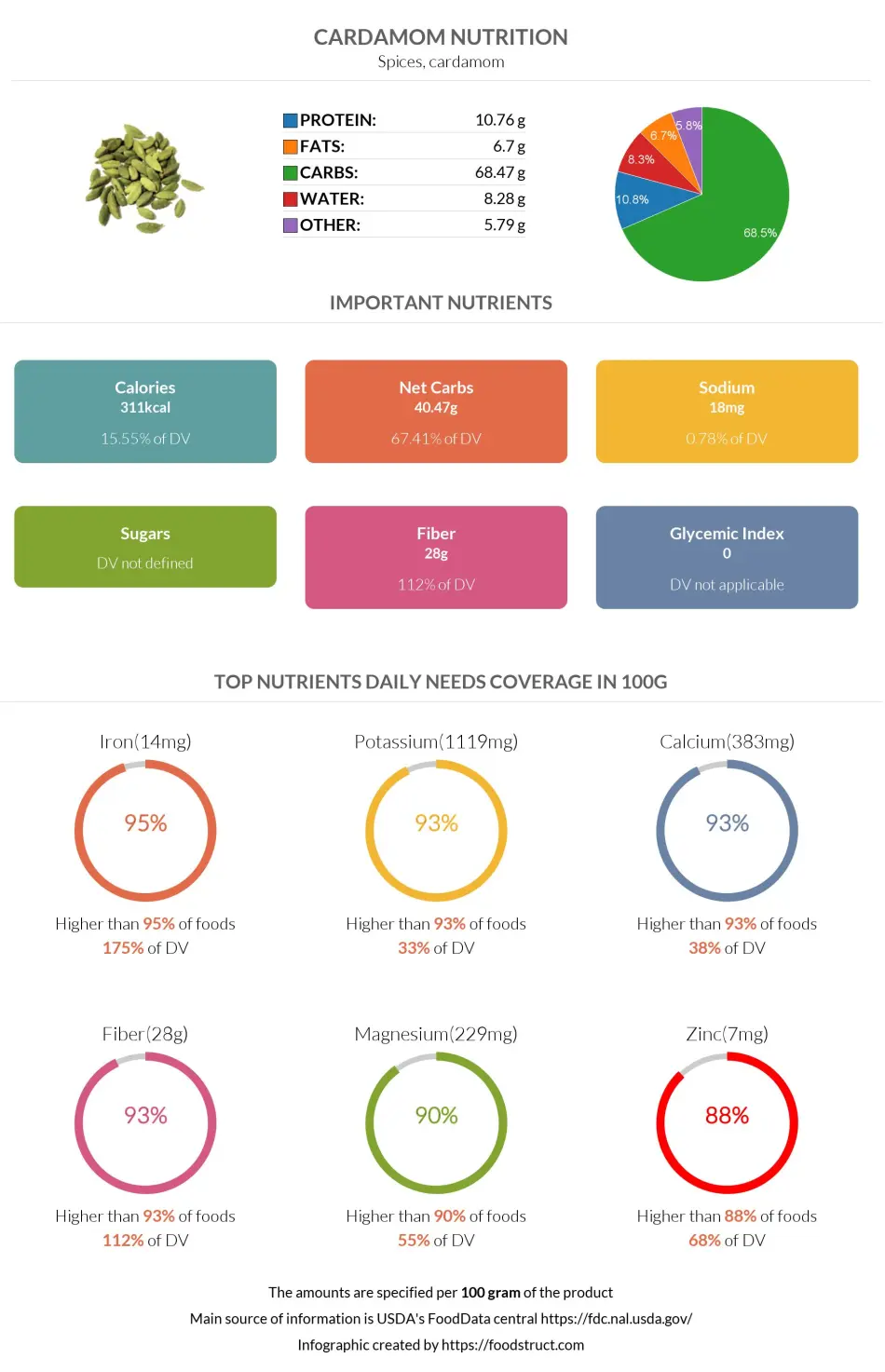
Infographic link
References
All the values for which the sources are not specified explicitly are taken from FDA’s Food Central. The exact link to the food presented on this page can be found below.
